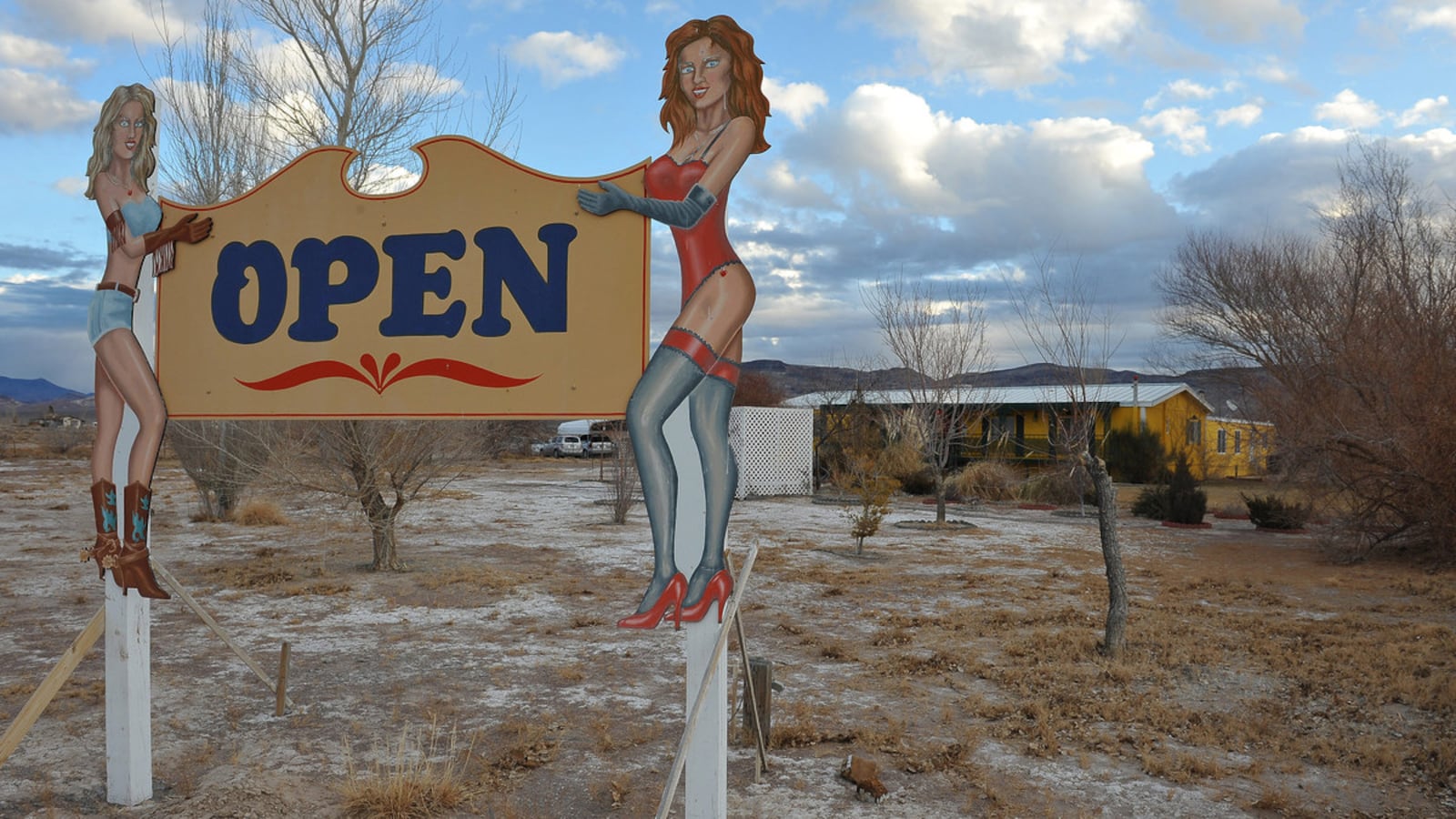When Nevada began shutting down in early March to help control the spread of the coronavirus pandemic, the state’s legal brothels stayed open. As late as March 17, a day before Governor Steve Sisolak ordered all non-essential businesses closed, the Nevada Brothel Association (NBA) issued guidelines on how to keep operating—safely.
“I remember thinking, ‘Wow, you can’t get your hair done, but you can come here and have sex,’” Imogen Steele, a sex worker affiliated with the Sagebrush Ranch brothel outside of Carson City, told The Daily Beast.
Given the flak brothels took over this, it may seem odd that on April 22, a day after Sisolak announced murky plans to start a phased reopening of Nevada in the coming weeks, Bella’s Hacienda Ranch, a brothel in the town of Wells, released a plan for how they believe their business could reopen in the near future. Said plans include “regularly testing each courtesan residing at the brothel for COVID-19,” brothel owner Bella Cummins said in her announcement, and “temporarily mandat[ing] mask use for patrons and bar staff while they’re on the premises.”
Chuck Muth, a spokesperson for the Nevada Brothel Association, said in an email that his organization has no industry-wide guidelines for post-lockdown life just yet, as “things are still very up-in-the-air.” But interviews with brothel owners, sex workers, and other industry players painted a picture of businesses eager to turn the lights back on—and some workers leery of exposure.
“It’s not ethical to open these establishments now,” said Roxanne Price, a sex worker who recently left Sheri’s Ranch, a brothel in Pahrump, and plans to live off her savings until an effective treatment or vaccine emerges. “Any close-contact work is probably not a good idea.”
Yet she and other sex workers suggested that this push was likely not about greed or disregard for danger—or at least not only those things. Instead, it also reflects deep fears about the industry’s unique fragility.
Nevada’s brothels can’t reopen unless Sisolak—whose office did not respond to a request for comment—gives them the all-clear, which does not appear to be on the horizon anytime soon. But Nathan Robertson, the mayor of Ely, a town with a couple of brothels, went so far in an email exchange as to liken brothels to “health, beauty, and wellness services,” suggesting they could reopen around the same time as gyms and hair and nail salons. (These sorts of businesses recently started to reopen in Georgia over the last week as part of its own reopening.)
Epidemiologists and infectious disease experts canvassed by The Daily Beast mostly suggested that this was a fair comparison, as all of these businesses involve prolonged close contact with other humans. But Lawrence Gostin, an expert on public health law and epidemic responses at Georgetown University, argued that, “while all of these activities pose heightened risk, the level of risk for close physical exposure during a sex act are decidedly higher” than that of, say, sitting in a barber’s chair.
Brian Labus, a communicable disease surveillance expert at the University of Nevada, Las Vegas, said in an interview he was actually encouraged to see brothels “taking steps to think about how they can mitigate risks to customers.” He added that he was not particularly concerned about these businesses, so long as they stayed in line with science-based recommendations and kept an eye on mitigating the risks of the unique physical contact involved in their work. (Multiple tests have failed to detect coronavirus in sexual fluids, though there is plenty in spit.)
Anna Yeung-Cheung, an infectious disease expert at Manhattanville College, expressed doubt about the possibility of finding a viable mix of risk mitigation strategies for sex with strangers. (“Are they going to wear masks to service their clients?” she mused.) But Jeffrey Klausner, an epidemiologist at the University of California, Los Angeles, suggested that a mix of restrictions on mouth-to-mouth contact, regular screening of clients and sex workers for disease symptoms, regular cleaning and vigilant personal hygiene, and disclaimers about the risks of prolonged personal contact with a stranger, could potentially sufficiently mitigate risks.
“Opening any business too early potentially puts people at risk,” though, Labus added.
Still, experts say the plans Cummins and other brothel operators are floating aren’t practical. Especially in the near term, they seem to hinge on the idea of incorporating coronavirus tests into the state’s mandatory weekly STI panels for legal sex workers—alongside social distancing and sanitation measures. As Labus noted, the United States is nowhere near being able to easily distribute and process regular tests for asymptomatic individuals. Even if tests were that accessible, he added, because people can potentially get infected and become infectious within a one-week window, regular coronavirus testing wouldn’t necessarily be enough to ensure a low transmission rate for sex workers, other brothel staff, or their clients.
Irwin Redlener, an infectious disease expert at Columbia University, argued that the only effective testing regime would be to require every client and sex worker to take a rapid test, which can return reliable results within minutes, before every sexual encounter. However, such tests are still very hard to come by, and available only to a select few—like people visiting the White House.
The problem is that Cummins and other insiders argued brothels will be in dire straits if they are locked down past June, and broad consensus holds that sex workers’ positions are even more precarious. Some have pivoted to digital sex work like camming, only to find the pay is low and competition is fierce. Most are hemorrhaging cash, and have had little to no luck accessing public benefits. Alice Little, a sex worker usually based at the Moonlite Bunny Ranch outside of Carson City, did recently launch SexWorkerSupport.com, a hub for info on industry relief funds. But these resources have hard limits; she said her income was down by over 80 percent.
She and Price have the savings to survive. Most do not.
“Financially, I am feeling pressure,” added Jasmine of the Desert Rose brothel in Elko, “and I will definitely be at work as soon as we can open.” Steele feels like her only alternative, if she can’t go back to her brothel soon, will be “shooting deer and making deer meat jerky to sell on the street.”
No one in the industry seems sure patrons will actually flock back to brothels if they open while fears about coronavirus linger. Since many sex workers don’t get set salaries, but instead make money per client, reopening to low turnout would do little to blunt their financial stresses. But Steele said she’s actually been getting more attention than usual from potential clients, many of whom she suspects are starved for intimacy. And Gabriel Ornelas, the owner of Desert Rose, said “many customers still come to our door and ring the doorbell,” even during the shutdown.
Barbara Brents, an expert on Nevada’s brothels at the University of Nevada, Las Vegas, said that some anti-sex work activists or authorities may want to use this crisis as an excuse to put brothels under extra scrutiny. That could involve imposing harsh top-down rules for reopening that effectively force them to stay shut far longer than comparably risky businesses.
For her part, Cummins told The Daily Beast that her announcement was less a firm plan (she’s open to adjusting her ideas as experts weigh in) and more an attempt to push back on these risks—to make sure that her industry doesn’t get neglected to death and has a say in building guidelines for its reopening.
Brents doubts even a long shutdown would kill Nevada’s legal brothel scene. But it could shutter some brothels, and seriously hobble others. That, Brents said, might push many sex workers who use them to escape the dangers of illegal street work back into more precarious situations—or at least unusual ones.
As Steele put it, "If things don't change by the 15th of May... I'm gonna be shooting some deer."







